The U.S. imperium is effectively spoiling for decisive confrontations with any power that threatens its crumbling primacy.
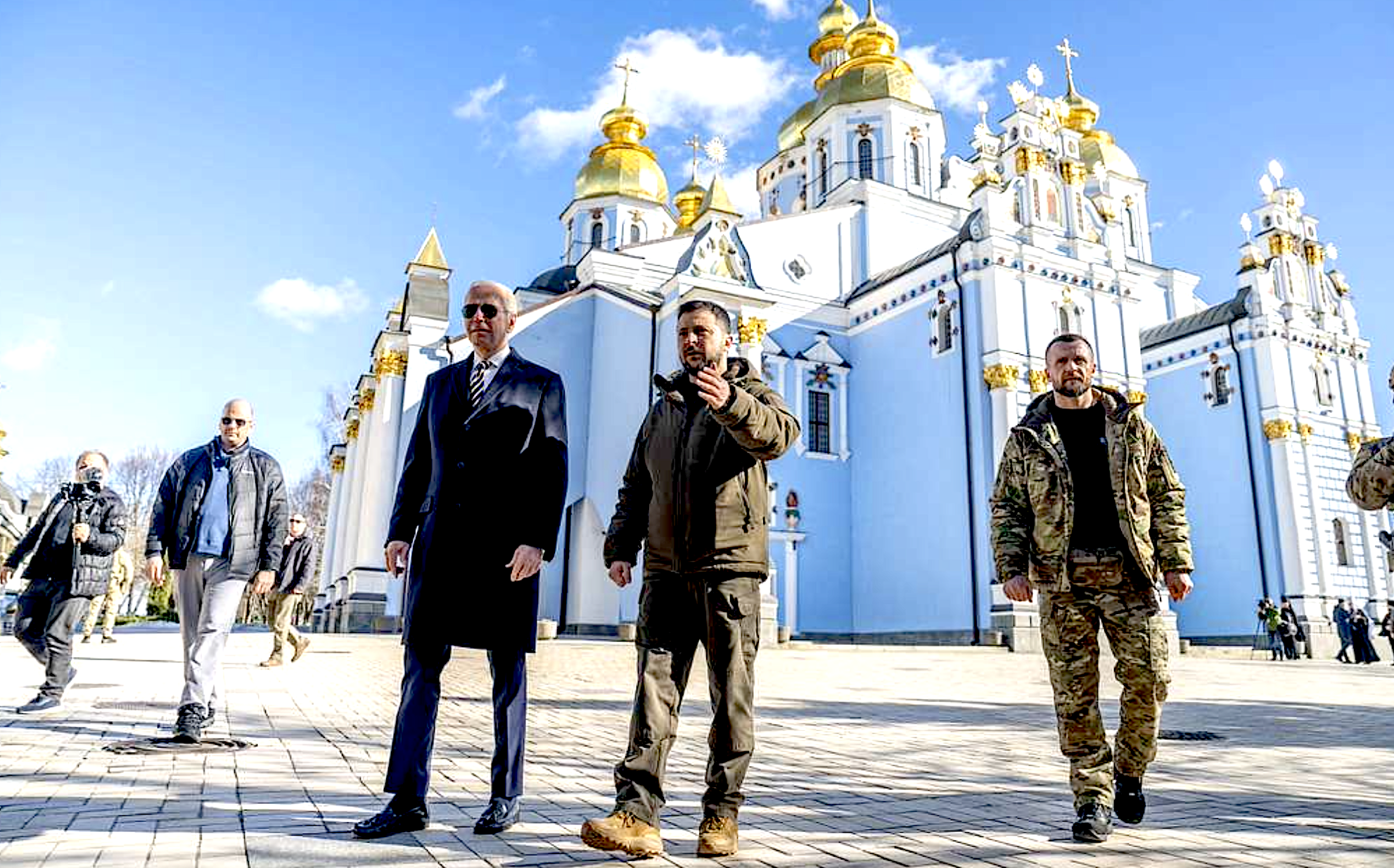
U.S. President Joe Biden and Ukraine’s President Volodymyr Zelensky in front of St. Michael’s Golden-Domed Monastery in Kiev, February 2023. (White House, Public domain)
By Patrick Lawrence
ScheerPost

It is some years now since a lot of people began imagining the specter of World War III in the near or middle distance.
This kind of thinking has been especially common since the U.S., with determination and purpose, provoked Russia to intervene in Ukraine three years ago this coming February.
A few weeks later President Joe Biden defended his decision to block the transfer of fighter jets to the Kiev regime by famously remarking, “That’s called World War III.”
It is obvious now, if it wasn’t then, that the Biden White House had already begun playing a reckless game of footsie with the Russians. Kiev now has squadrons of F–16s in the air, Abrams tanks on the ground, and Patriot missiles standing guard. Same story.
When, in mid-November, Biden (or whoever makes decisions in his name) gave Ukraine permission to fire long-range missiles into Russia, warnings of World War III came quickly. “Joe Biden is dangerously trying to start WWIII,” Marjorie Taylor Greene, the Georgia Republican, said on “X.” You heard similar remarks from the Kremlin and the Russian Duma.
War Everywhere You Look
The risk of a new global conflict could scarcely be more evident as 2025 begins. A sound survey of our geopolitical circumstances tells us the imperium, in an increasingly desperate state as its hegemony is challenged, is effectively spoiling for decisive confrontations with any power that threatens its longstanding but crumbling primacy.
As I have argued severally these past few years, the policy cliques in Washington concluded they had reached a shoot-the-moon moment when they committed the U.S. to the proxy war in Ukraine, an all-out operation to bring down the Russian Federation.
We must now read this hubristic ambition as part of a larger story, a worldwide story, a story of war everywhere you look.
But we need to get beyond all thoughts that we stand at the edge of a “World War III” of the kind that scarred the previous century. The phrase obscures more than it reveals. It prompts us to search the past for an understanding of our present, and — as is the case with so much about our new century — the past is not of much use to us. At some point — I would say after the attacks of Sept. 11, 2001 — we entered uncharted territory.
The world is at war, yes, but ours are wars of a different kind by way of the technologies and methods used to wage them — to say nothing of the objectives of those who start them. The nature of power and how it is exercised have been transformed.
When taken together, the sheer magnitude of our wars is — and I am ever cautious with this term — unprecedented.
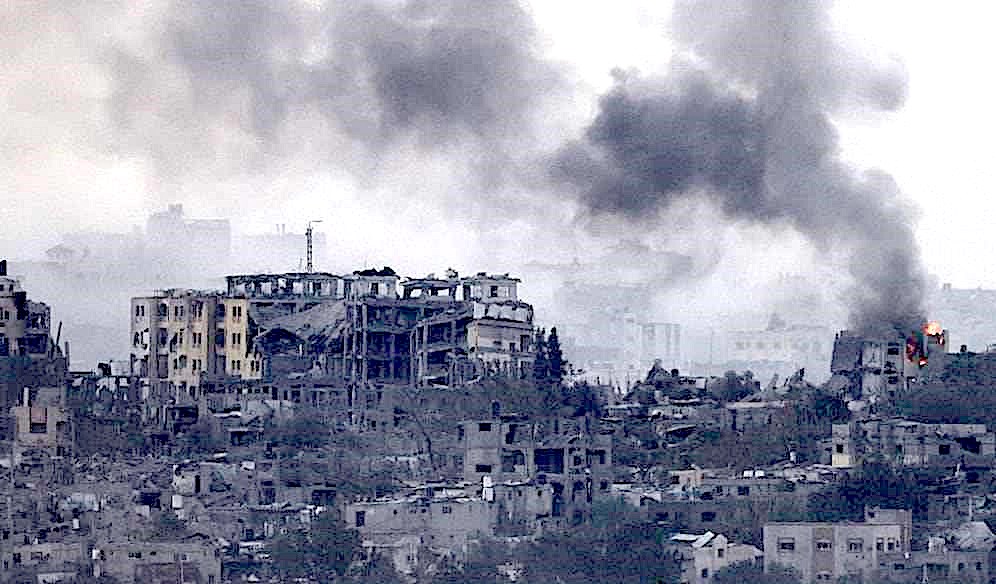
Damaged buildings in Gaza, Dec. 6, 2023. (Tasnim News Agency, Wikimedia Commons, CC BY-SA 4.0)
Like it or not we are making history, to put this point another way. And when one’s age is making history there is no repeating or referencing history because the events of the age have no parallel in the past.
The two world wars were waged in defense of democracy and ended with negotiations after decisive victories on battlefields. The wars we witness — let us be very clear about this — are destroying democracy, and those waging these wars make it bitterly plain they have no intention of negotiating anything with those they have turned into adversaries.
This bodes very badly for the character of the transformation that is to come.
The wars that beset us — in Europe, in West Asia, in East Asia — are many. With or without military engagement, they have already started. But to step back even a small distance, they seem to me to be one.
This is a war between a power that has reigned without serious challenge for half a millennium and the powers, non–Western powers, the 21st century thrusts forth in the name of global parity.
The one is fading, the other emergent. The world is at war, and it is a war of worlds.
‘The West’
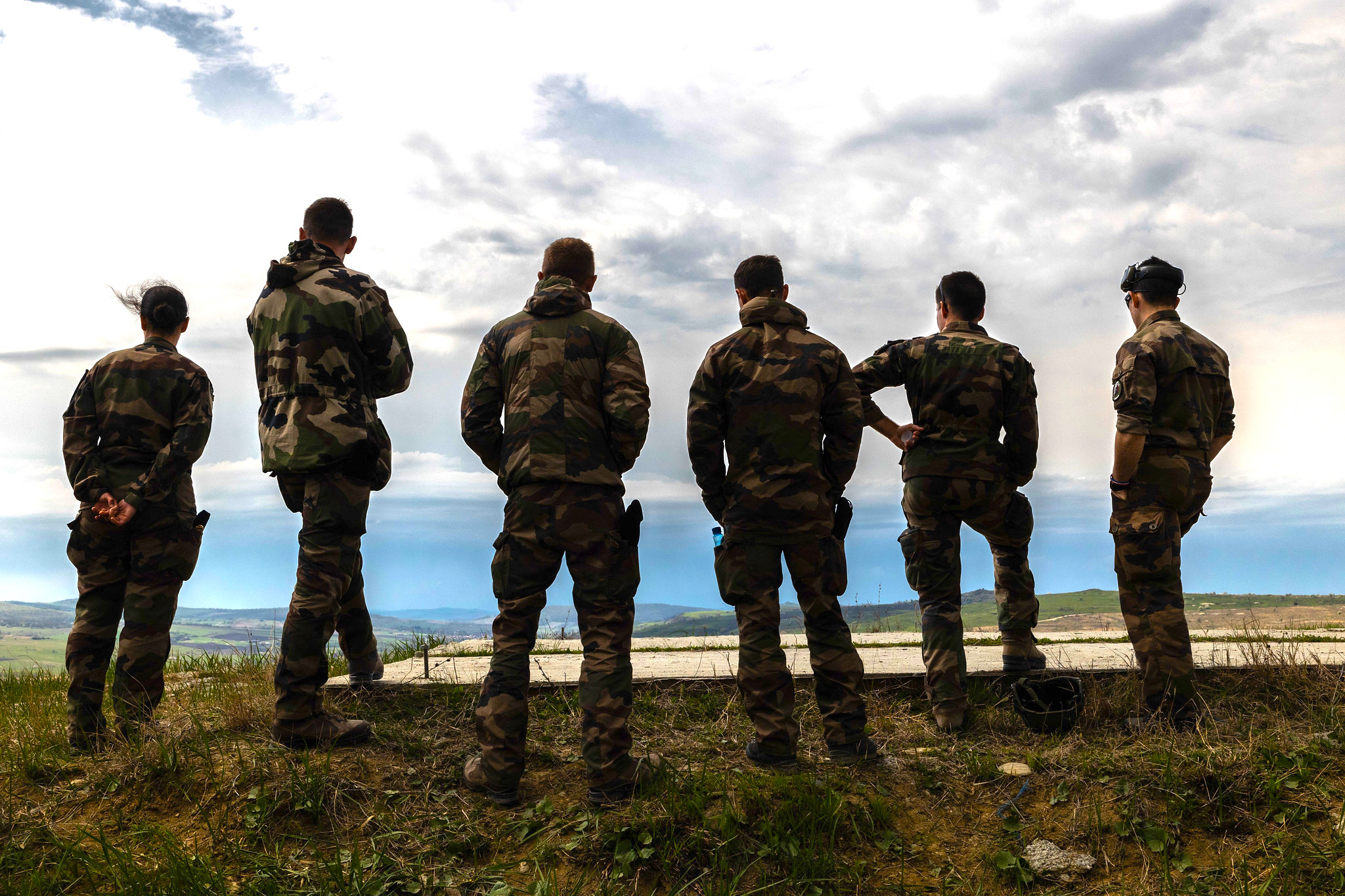
French soldiers observe a live-fire NATO multinational battlegroup exercise in Cincu, Romania, in the Black Sea region, on April 27, 2022. (NATO, Flickr, CC BY-NC-ND 2.0)
If I had two words to explain why the world is in so perilous a state, I would have no trouble settling on “the West.” I have made reference to history. Let us have a look around in it in this connection.
The notion of the West is at least as old as Herodotus, chronicler of the Persian Wars, who described the line separating the West from the rest as imaginary.
The term acquired many meanings over many centuries. But it was in the 19th century that the West was first understood as a modern political construct. This was in response to the modernization project Peter the Great had set in motion in the early 1700s.
So “the West” was defensive from the first, formed in reaction. There was also something unconscious reflected in it. Russia was the East, given to communal forms of social organization and some dark, irrational peasant consciousness, pre–Cartesian and anti–Western to its core — and so an implicit threat, never to be any other.
Here is Alexis de Tocqueville, in the first volume of Democracy in America, which he brought out in 1835:
“There are at the present time two great nations in the world, which started from different points but seem to tend towards the same end. I allude to the Russians and the Americans. Both of them have grown up unnoticed; and whilst the attention of mankind was directed elsewhere, they have suddenly placed themselves in the front rank among the nations, and the world learned their existence and their greatness at almost the same time…. Each seems called by some secret design of Providence one day to hold in its hands the destinies of half the world.”
A dozen years later Charles Augustin Sainte–Beuve, the historian and critic, made a more daring case:
“There are now but two great nations — the first is Russia, still barbarian but large, and worthy of respect…. The other nation is America, an intoxicated, immature democracy that knows no obstacles. The future of the world lies between these two great nations. One day they will collide, and then we will see struggles the like of which no one has dreamed of.”
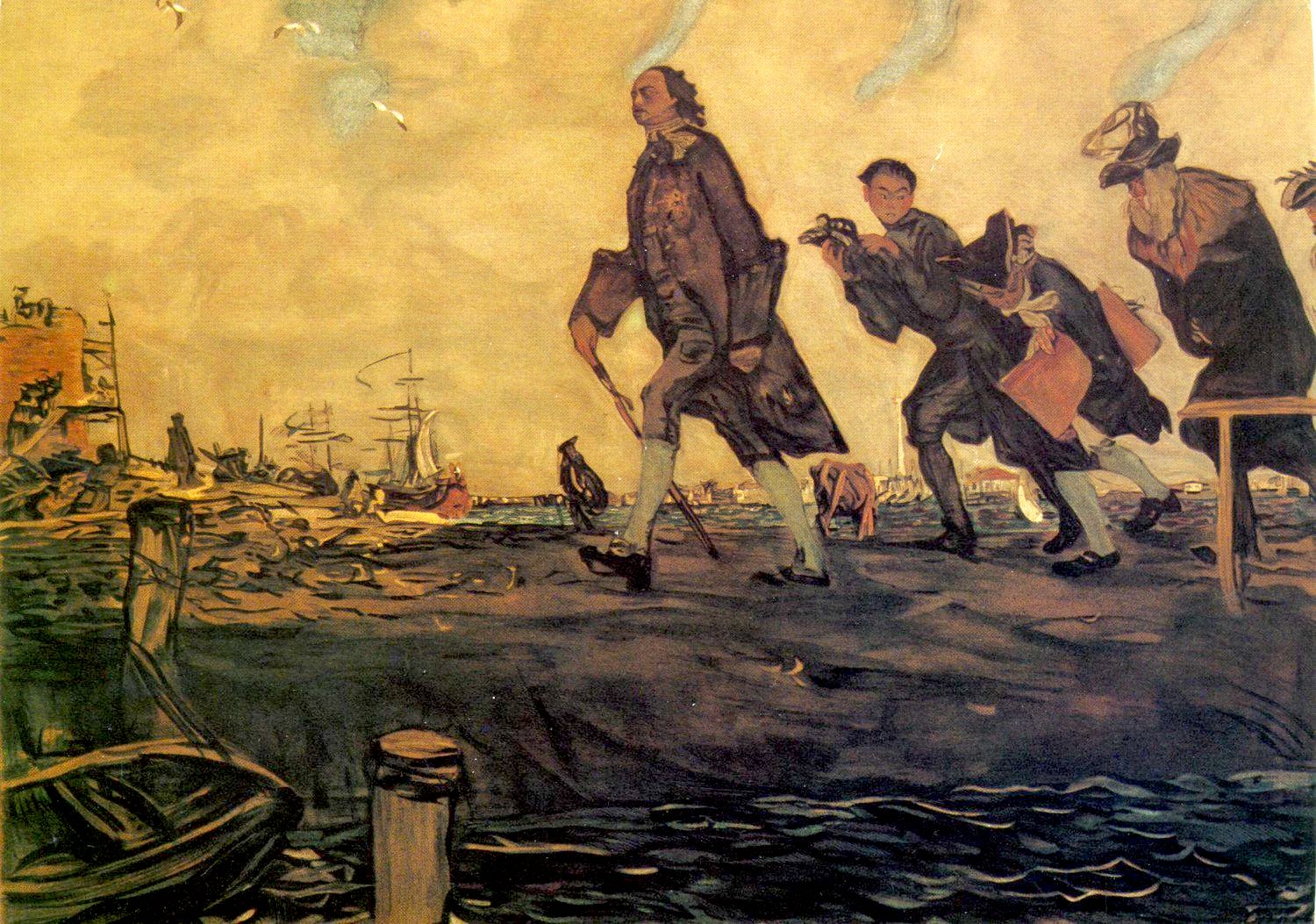
Detail of Peter the Great in the 1907 painting by Valentin Serov, Tretyakov Gallery, Moscow. (Wikimedia Commons, Public Domain)
A short while later Jules Michelet, the celebrated historian, was first to call for “an Atlantic union,” meaning a trans–Atlantic union. Michelet, it is worth noting, made it plain he considered Russians to be sub-human. So it was that by the 1870s “the West” as we know it was fully ascendant, as was “the East” as the Atlantic world’s great Other.
I have no idea why it was the French who proved so prescient on this question, but it is impossible not to be impressed by their foresight. Sainte–Beuve got it right as rain when he predicted a world-enveloping struggle of which no one had yet dreamed. It is our curse that we witness this today, 177 years after he made his observations.
At the same time we have to recognize these writers’ lapses and failures. The civilized-vs.-the-savage theme is prevalent in all these writings, unfortunately. De Tocqueville put this in terms of opposites:
“The former [the young United States] combats the wilderness and savage life; the latter, civilization with all its arms. The conquests of the American are therefore gained with the ploughshare; those of the Russian by the sword.”
This is nothing more than clunky, Westcentric stuff — damaging to the extent it has since marked accepted thinking all the way to Joe Biden’s White House.
And the French seers of the mid–19th century failed to see — it could not be otherwise, we have to say — that the collisions of which Sainte–Beuve wrote would take many strange forms and extend far beyond Czarist Russia.
Power Versus Strength

Voting în Moldova’s elections, October 2024. (Parlamentul Republicii Moldova, Wikimedia Commons, CC0)
Craig Murray, formerly a British ambassador in Central Asia and now a committed critic of Western policy, published a piece in mid–December under the headline “Abolishing Democracy in Europe.” In it he described the effective disenfranchisement of a half-million Moldovan voters resident in Russia when presidential elections were held this past autumn.
He goes on to consider the case of Georgia, whose president, a French citizen for most of her life, now point-blank refuses to leave office despite her defeat in elections this year. And he then takes up Romania, where courts recently disqualified the winning presidential candidate on the wholly specious grounds that he may have benefited — repeat may have, there is no evidence of this — from social media campaigns favorable to Russia.
Murray is right to treat these events together. All three involve Western-inspired political and institutional corruptions in the cause of installing Russophobic leaders who favor ties to the European Union regardless of popular preferences. This is war by any other name, in its way as vicious if not as violent as the proxy war in Ukraine. It is a theater in the war of worlds that besets us.
Please Support CN’s
Winter Fund Drive!![]()
West Asia is another. There continues to be debate as to whether Israel runs U.S. policy in the region or whether the U.S. runs Israel as its client. I remain of the latter conviction, as I have made clear here and here. Israel is the great beneficiary now that Syria, a secular nation, has fallen to opportunist jihadists.
All signs are that Iran is next on the Zionist state’s list. But the imperative here is to understand the startling pace of events in West Asia as part of Washington’s larger quest to bring the entire globe under its imperial control.
Is war with China inevitable? I am not sure this is any longer the interesting question. If we begin counting from the U.S.–cultivated coup in Kiev in February 2014, it was eight years before a war few could see broke into open conflict. It seems to me that in the China case we are in 2014 or thereabouts.
‘A Fixation’
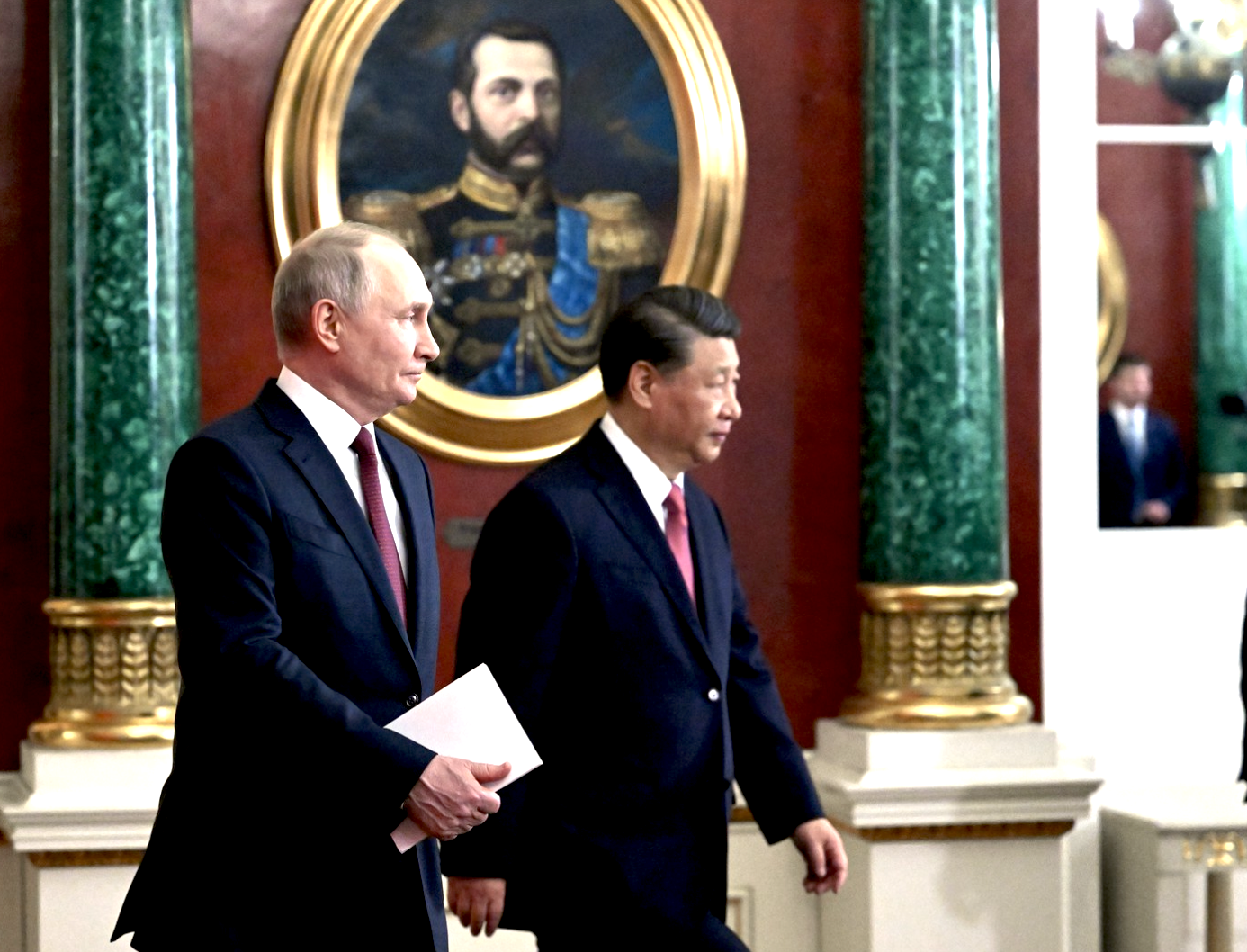
Russian President Vladimir Putin and China’s President Xi Jinping during talks in Moscow in March 2023. (Vladimir Astapkovich, RIA Novosti)
A year ago a prominent general predicted the U.S. would be at war with the People’s Republic by 2027. Defense News, which reliably reflects official thinking, now reports that war the year after next “is a fixation in Washington.”
Just before Christmas, Military Times reported that the Biden White House authorized $570 million in new military assistance to Taiwan; the Pentagon concurrently announced $300 million in new military sales. These are big numbers in the Twain context. Beijing immediately declared its vigorous objections.
Tell me, should we continue wondering whether war with China is inevitable? Or should we conclude that another theater in our war of worlds has already opened?
Destruction From Within
Yanis Varoufakis, that wise man of Athens, published a piece in Project Syndicate on Dec. 19 under the headline, “The West Is Not Dying, but It Is Working on It.” “Western power is as strong as ever,” Varoufakis begins. But he then argues that the U.S. and its trans–Atlantic clients are destroying themselves from within:
“What has changed is that the combination of socialism for financiers, collapsing prospects for the bottom 50%, and the surrender of our minds to Big Tech has given rise to overweening Western elites with little use for the last century’s value system.”
Democratic process, in other words, social or economic equality by any measure one chooses to apply, any thought of the commonweal, the rule of law — all have been foregone as no longer of use. This is not the triumph of the governing classes: It is the governing classes destroying their societies and so themselves. Such is Varoufakis’ case in sum.
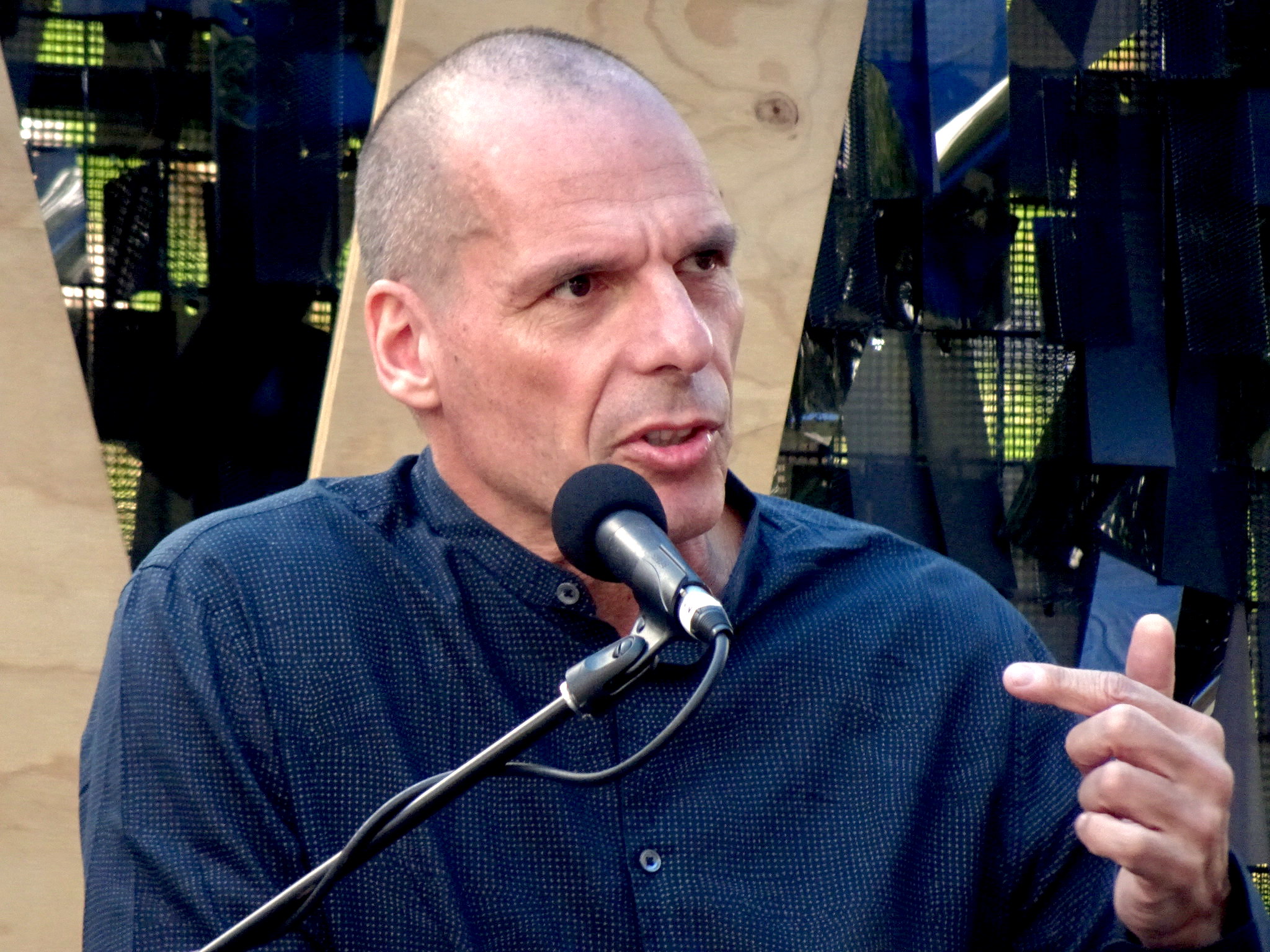
Varoufakis in 2020. (Michael Coghlan, Flickr, CC BY-SA 2.0)
I could scarcely agree more robustly. The West, just as the old French philosophers anticipated, has engaged its Other this past year and decisively demonstrated its power. But power and strength are two different things, as I have long insisted.
Domestic decay, deindustrialization, rampant poverty and inequality, cultivated ignorance, addictions to self-deception, the utter absence of any kind of domestic consensus on either side of the Atlantic: These are passingly of benefit to the conduct and interests of empire.
But in the middle distance nations reliant solely on power while neglecting the sources of strength enter a cycle of decline that self-accelerates.
America is losing in our world of wars and our war of worlds. I see no case otherwise if we consider history’s longue durée. But we must immediately note that America has never surrendered in war or negotiated from a position of weakness.
We may count Vietnam an exception, but the Americans did not abandon their war against the Vietnamese until, with the dramatic rise of Saigon in April 1975, they were forced desperately to exit in helicopters from the roof of the Pittman Apartments, where the C.I.A. deputy station chief lived.
Maybe Afghanistan is another such case, but in my view Washington continues to wage war by other means against Kabul.
The question remains in the large just as it is in Ukraine: What happens when a great but declining power loses a war, the very most decisive war, it cannot afford to lose? We have not been here before. History is of little use as a guide.
Patrick Lawrence, a correspondent abroad for many years, chiefly for the International Herald Tribune, is a columnist, essayist, lecturer and author, most recently of Journalists and Their Shadows, available from Clarity Press or via Amazon. Other books include Time No Longer: Americans After the American Century. His Twitter account, @thefloutist, has been permanently censored.
TO MY READERS. Independent publications and those who write for them reach a moment that is difficult and full of promise all at once. On one hand, we assume ever greater responsibilities in the face of mainstream media’s mounting derelictions. On the other, we have found no sustaining revenue model and so must turn directly to our readers for support. I am committed to independent journalism for the duration: I see no other future for American media. But the path grows steeper, and as it does I need your help. This grows urgent now. In recognition of the commitment to independent journalism, please subscribe to The Floutist, or via my Patreon account.
This article is from ScheerPost.
The views expressed are solely those of the author and may or may not reflect those of Consortium News.
Please Support CN’s
Winter Fund Drive!![]()
Make a tax-deductible donation securely by credit card or check by clicking the red button:


Ah, Perfidious Albion, grudgey, grudgey, grudgey. An honest and truthful one word answer would be “greedy,” but there is nuance to be had here.
Gripey, gripey, gripey was likely a London theme when Catherine the Great refused George III 20,000 Russian troops to quell the American colonies in their rebellion. So George had to settle for the Hessians as mercenaries.
Then came Alexander II sending two Russian naval fleets to protect the Union during the US Civil War, blockading New York Harbor, and San Francisco Bay both from British and Confederate intrigues. It had been less than a decade since the Crimean War where the Americans had built ships and small craft from Eastern Seaboard shipyards, especially from New York for the Russians, as well as sending medical personnel to aid the Russian side, albeit as neutrals.
Still smarting from Crimean War debts in 1867, Czar Alexander sent his envoy to D.C. to inquire if the U.S. would be interested in purchasing Alaska for a very good price, which indeed ultimateley transpired for the price of 3 cents per acre ($7,200,000.)
This kept Britain from establishing not only a solid stretch of coastline from British Columbia to the Arctic Ocean and the entirety of the northern hemisphere north of the U.S. border, but also kept John Bull from being a very unwanted neighbor to Russia’s easternmost flank. After all, it was the Brits who had conspired to keep Russia bottled up inside the Black Sea (preventing competition in India) by initiating the Crimean conflict. So, the enmity remains to this day, helped along by contemporary events.
Could someone please enlighten me as to why the British aristocracy harbors such antipathy towards the Russians? I know it goes back way before 1917, but what is the historical precedent?
{Some great comments in here by the way. Rafi’s comment in particular is downright poetic}
A mystery to me also. It’s like some secret only the Brits know, and they ain’t talking. Weird !
Thank you for your astute analysis and for your deep knowledge of history. Given the West’s opposition to a world struggling to be born and its efforts to prevent its birth, our future appears bleak. Ironically, the only hope is suggested by Varoufakis’ argument that the west’s actions result in a weakening not of their adversaries but of themselves, e.g., destruction of the nordstream pipeline, sanctions on Russia, alienation of most of the world.
Isn’t the answer obvious to “What happens when a great but declining power loses a war, the very most decisive war, it cannot afford to lose?” Doesn’t it attempt a hail mary pass in the form of a preemptive nuclear strike?
Thank you Patrick. Your last paragraph deserves a reread, or two. What happens when a great power loses a war that it cannot afford to lose ? Uncharted territory. I’m a bit more optimistic with the Trump team charting the course than with Kamala doing so, but my confidence level is not high. I’m convinced that the key to a more peaceful world and a more prosperous and equitable USA begins with the political class accomplishing a huge (70%) reduction in ourDepartment of War budget. Until that occurs, the world is doomed to chaos, conflict, and forever wars.
This essay was linked to me through Naked Capitalism. I cannot believe you don’t have hundreds of thousands of comments. A voice in the wilderness indeed. I feel very sobered and am not sure how to act—after fruitless years of “protest”— I am moved to fast and pray. I find it hard to believe there is a “democratic” answer. Please keep sounding the alarm. Some of us are paying heed.
In a post Einstein, post Heisenberg world of relativity and uncertainty, what you see depends on what you believe. Yet neolib econopaths and lust for empire neocons are certain the world is Hobbesian– a fight for dominance where there can be only one winner. Their form of Oneness is MICIMATT as 0ne, in service to one corporate Unipolar empire. They only see via the either/or of Aristotelian logic; the law of the excluded middle. So only true/false, good/evil, with us/against us. They can’t see beyond their constricted, vicious reality tunnel kept afloat by the blood of millions.
They don’t see the living Earth and its wildly diverse life. Or its real world symbioses–like how trees connect via fungi on their roots, making cooperation the most common way of life, not competition. Like their PNAC guru Dick Cheney, their hearts no longer function naturally. They’re bedazzled by technology; by abstract theories and cold calculations. They’re Atlanticists who believe in the world of two centuries ago and themselves as center of that world. And apparently they’re willing to sacrifice life on Earth to preserve their grandiose illusion.
We on the Pacific side of North America, the global South, the BRICS countries, Indigenous peoples, and everyone else with eyes open know there are other oceans and greater realities. In the short run, the deluded have the power to prevail. In the long run, they can’t because endless econ growth and the unbounded lust for power aren’t possible on a finite planet. Let’s hope there are enough people who understand cooperation and who respect natural constraints still alive in the decades to come. Or if life on Earth has to emerge after the 6th Great Extinction, may it be like sentient slime molds–creatures that understand both living as individual parts and coming together as the collective whole.
Surely, the great thinkers who posited a contest between Russia and the USA for the world were cross-eyed on white civilizations to the exclusion of all others to the point of blindness … it was only a momentary accident of chance and history that European civilizations had world primacy for the period between 1750 and 2000. That era is passed for good and the other strong worldly human civilizations of history, China, India, and to a lesser extent the Middle East and Central and South America will take their rightful spots in the world. Sheer numbers and people talent will tell and nothing can stop this (thank goodness!)
As for us USians, we will need to get used to a normal role in world affairs. The era of our 0.01% breeding a managerial class to create havoc and death around the world for their profits (excused by “manifest destiny” to “defending liberty” to “defeating the new Hitler” to “war for democracy and rule-based order”, etc. all being narrative devices to hide fact that the US fights wars NOT for empire or power or anything other than $$$ for the powers that be) is getting to a close and about damn time too!
Thank you for another astute analysis. Your closing question couldn’t be more poignant.
What price will the world pay to learn the answer?
“As I have argued severally these past few years, the policy cliques in Washington concluded they had reached a shoot-the-moon moment when they committed the U.S. to the proxy war in Ukraine, an all-out operation to bring down the Russian Federation.”
And, one asks, why we need to bring down the Russian Federation? Up until 1989, they were the Commie Soviet Union, a constant threat, we were told, to our very existence. Once they went away, how did the Russians then become a threat once again? These Neo-Con idiots, desperate for enemies, will do anything to bring about our own demise. And the pathetic, lying cheerleaders in the mainstream media are doing their best to help it along.
Russia and China are infringing on USA corporate profitability. Russia, Nordstreem pipeline. China, Huawei.
The USA is also frightened that China has taken the lead in technology as demonstrated by being first to 5G. China has sixteen times as many smart people as does the USA, a huge advantage in high tech.
The only way the USA could defeat these nations is with nuclear war. I hope this is not the plan.
Short of that the idea is to boost profits of the politically well connected by the endless lobbing of expensive missiles into Russia and China.
Indeed, we are living in very interesting times that have no precedence. Let us hope there will be enough of us left for our species to actually learn some beneficial lessons from all this.
It seems to me that we, the human race, don’t learn…not even the hard way. :-(
Oh, we learn, Vera; we learn the way an abused child learns.